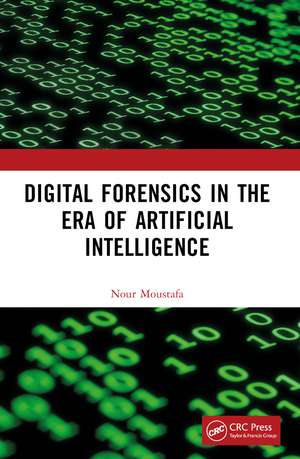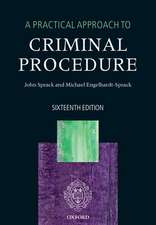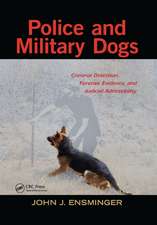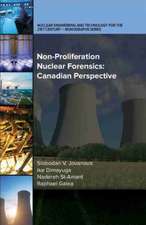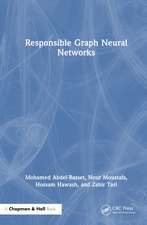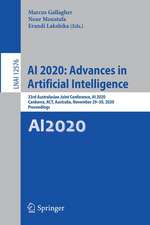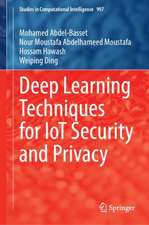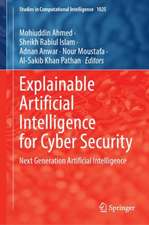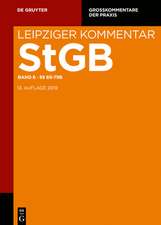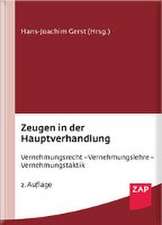Digital Forensics in the Era of Artificial Intelligence
Autor Nour Moustafaen Limba Engleză Paperback – 18 iul 2022
This book demonstrates digital forensics and cyber-investigating techniques with real-world applications. It examines hard disk analytics and style architectures, including Master Boot Record and GUID Partition Table as part of the investigative process. It also covers cyberattack analysis in Windows, Linux, and network systems using virtual machines in real-world scenarios.
Digital Forensics in the Era of Artificial Intelligence will be helpful for those interested in digital forensics and using machine learning techniques in the investigation of cyberattacks and the detection of evidence in cybercrimes.
| Toate formatele și edițiile | Preț | Express |
|---|---|---|
| Paperback (1) | 299.08 lei 3-5 săpt. | +19.69 lei 4-10 zile |
| CRC Press – 18 iul 2022 | 299.08 lei 3-5 săpt. | +19.69 lei 4-10 zile |
| Hardback (1) | 649.99 lei 6-8 săpt. | |
| CRC Press – 18 iul 2022 | 649.99 lei 6-8 săpt. |
Preț: 299.08 lei
Preț vechi: 373.85 lei
-20% Nou
Puncte Express: 449
Preț estimativ în valută:
57.25€ • 62.20$ • 48.12£
57.25€ • 62.20$ • 48.12£
Carte disponibilă
Livrare economică 31 martie-14 aprilie
Livrare express 14-20 martie pentru 29.68 lei
Preluare comenzi: 021 569.72.76
Specificații
ISBN-13: 9781032244686
ISBN-10: 1032244682
Pagini: 256
Ilustrații: 348
Dimensiuni: 156 x 234 x 19 mm
Greutate: 0.47 kg
Ediția:1
Editura: CRC Press
Colecția CRC Press
ISBN-10: 1032244682
Pagini: 256
Ilustrații: 348
Dimensiuni: 156 x 234 x 19 mm
Greutate: 0.47 kg
Ediția:1
Editura: CRC Press
Colecția CRC Press
Notă biografică
Dr Nour Moustafa is currently Senior Lecturer and leader of Intelligent Security Group at the School of Engineering & Information Technology, University of New South Wales (UNSW Canberra), Australia. He is also Strategic Advisor (AI-SME) at the DXC Technology, Canberra, Australia. He was a Post-doctoral Fellow at UNSW Canberra from June 2017 to December 2018. He received his PhD degree in Computing from UNSW, Australia, in 2017. He obtained his Bachelor and Master degree in Computer Science in 2009 and 2014, respectively, from the Faculty of Computer and Information, Helwan University, Egypt. His areas of interest include Cyber Security, particularly network security, IoT security, intrusion detection systems, statistics, deep learning and machine learning techniques. He has several research grants from industry and defence sponsors, such as Australia's Cyber Security Cooperative Defence Centre, Australian Defence Science and Technology Group, and the Canadian Department of National Defence. He has been awarded the 2020 prestigious Australian Spitfire Memorial Defence Fellowship award. He is also a Senior IEEE Member, ACM Distinguished Speaker, and Spitfire Fellow. He has served his academic community as the guest associate editor of multiple journals, such as IEEE Transactions on Industrial Informatics, IEEE Systems, IEEE IoT Journal, IEEE Access, Ad Hoc Networks, and the Journal of Parallel and Distributed Computing. He has also served over seven leadership conferences, including as vice-chair, session chair, Technical Program Committee (TPC) member and proceedings chair, including for the 2020–2021 IEEE TrustCom and 2020 33rd Australasian Joint Conference on Artificial Intelligence.
Recenzii
"Digital forensics is a very important topic. Using Machine Learning for digital forensics will detect cyber-attacks and assist investigators"
-Izhar Ahmed Khan, College of Computer Science & Technology, Nanjing University of Aeronautics and Astronautics, China.
-Izhar Ahmed Khan, College of Computer Science & Technology, Nanjing University of Aeronautics and Astronautics, China.
Cuprins
Preface. Dedication and Acknowledgment. Author. Acronyms. 1. An Overview of Digital Forensics. 2. An Introduction to Machine Learning and Deep Learning for Digital Forensics. 3. Digital Forensics and Computer Foundations. 4. Fundamentals of Hard Disk Analysis. 5. Advanced Hard Disk Analysis. 6. File System Analysis (Windows). 7. Digital Forensics Requirements and Tools. 8. File Allocation Table (FAT) File System. 9. NTFS File System. 10. FAT and NTFS Recovery. 11. Basic Linux for Forensics. 12. Advanced Linux Forensics. 13. Network Forensics. 14. Machine Learning Trends for Digital Forensics. Index.
Descriere
The book demonstrates digital forensics and cyber investigation techniques with real-world applications. It examines hard disk analytics and style architectures, including Master Boot Record (MBR) and Guide Partition Table (GBT) as part of the investigative process.
